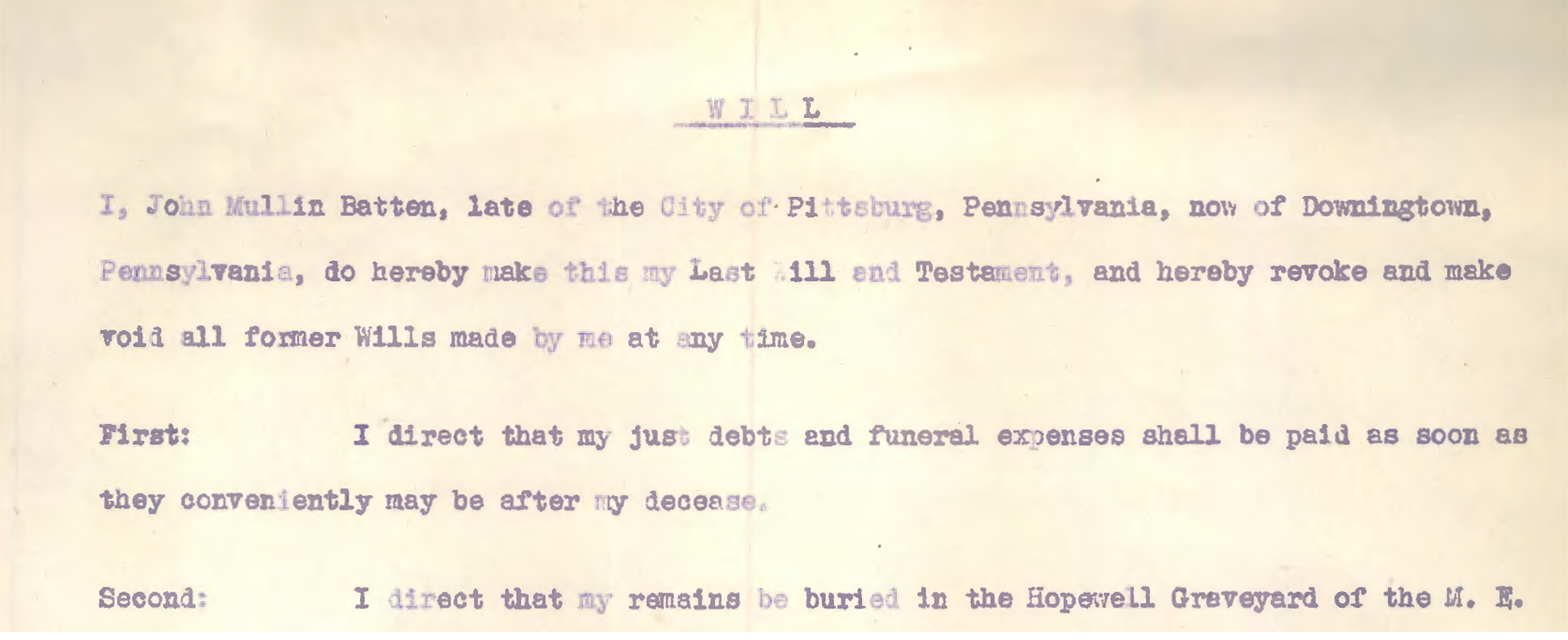Growing painsBatten Fund adapts to meet the needs of youth

Last will and testament of James Mullen Batten.
In its earliest days, The Pittsburgh Foundation was a place where banks and trust companies could transfer charitable funds established by their clients. Using will and trust documents as guides, the Foundation has always sought to fulfill the donor’s original intent. But, due to financial constraints or shifting societal needs or norms, that is sometimes impossible. That was the case with the John Mullin Batten Trust. In his will, originally written in 1914, Batten set aside $3,000 “to provide a suitable home for a suitable number of white male orphans between six and 14 years of age.” The home was meant to be run by a board consisting of Batten’s next of kin and the president of the Commonwealth Trust Company in Pittsburgh.
The trust met with The Pittsburgh Foundation in 1956 and the fund was established the following March. It quickly became evident that $3,000 would not be sufficient for the project. Foundation staff then collaborated with community experts to find ways to meet community needs while preserving the original intent of the fund.
Insufficient funds were not the only factor. After World War II, the need for orphanages greatly decreased as smaller, treatment-based facilities became the norm. And, as American institutions moved toward desegregation, it became clear that restricting the fund to only white boys who were orphaned “would place a difficult identification and accounting burden on the institutions and would probably result in a distribution pattern that does not conform to current needs and realities,” according to former Foundation Assistant Director William Lafe in fund documents from 1975.
Working with advisors at the Commonwealth Trust Company, the Foundation explored ways to broaden grantmaking to support low-income children and youth regardless of race or ethnicity. By the end of 1975, the Foundation established new guidelines for grants from the Batten Trust. The guidelines were, in part, informed by an order from the Orphan’s Court of Batten’s home county, Chester. Orphan’s Courts frequently work with community foundations in order to determine how funds should be maintained in the vision of the original donor. The court directed that money in the fund be used to finance casework costs and fresh air camps, as well as other youth-focused agencies and institutions.
The Foundation still collaborates with the Orphan’s Courts under some circumstances. The Foundation also relies on the expertise of the staff who serve on the Trust Administration Committee (TAC). Though active before, TAC was formalized in 2004. TAC members meet monthly to discuss how to make sure that funds remain aligned with a donor’s original intent when the organization or cause named in a fund becomes obsolete. TAC’s role is particularly important when there are no living donors associated with a fund to turn to for guidance. TAC has the ability to exercise what is called “variance power” over the administration of funds. Variance power allows the Foundation to look for organizations that align with the donor’s wishes in as realistic a manner as possible and which also more closely align with the Foundation’s institutional values and community needs. When variance power is not available, TAC will also turn to the Orphan's Court to approve the change in the fund’s purpose.
Back to the future: Thanks to investments by the Foundation, the original 1956 fund of $3,000 has grown significantly and has made nearly $1 million in grants to summer camps, children’s programs in the Hill District and to organizations such as the Boys and Girls Clubs of Western Pennsylvania. Grants have also been made to programs that once served orphans including Gilmary School, Three Rivers Youth, Toner Institute, Auberle Home and Ward Home. Nearly one-third of these grant funds go to summer camp programs in Chester County, where Batten grew up. Additionally, the fund continues to allocate resources to programs that provide care for children with disabilities and those that provide services to children in need of health care and other basic needs.
In the more than 77 years that The Pittsburgh Foundation has been operating, working with donors to provide for the community has been at the center of the organization’s mission. Much has changed in that time and the Foundation has made changes too. The Batten Fund is the perfect example of the Foundation’s ability to make significant impact and find solutions that uplift the people it serves.
Liam Watters is a summer 2022 Communications Intern at the Foundation. He is studying political science and philosophy at Denison University.




